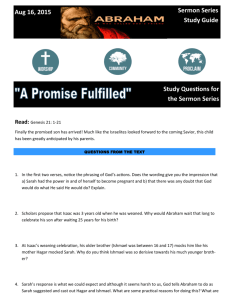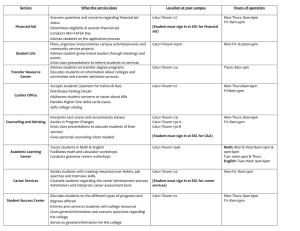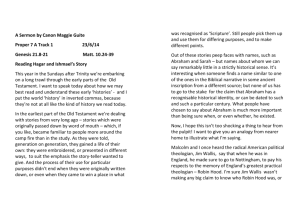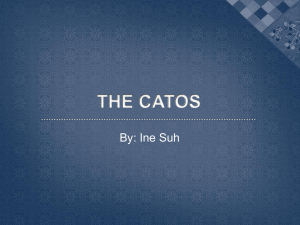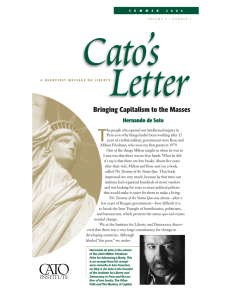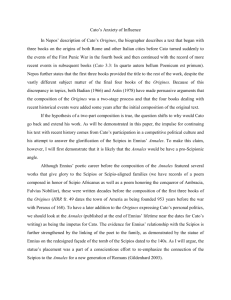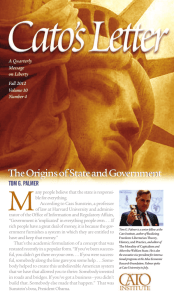NOTES SUR MOBY-DICK, chapitre 1
advertisement
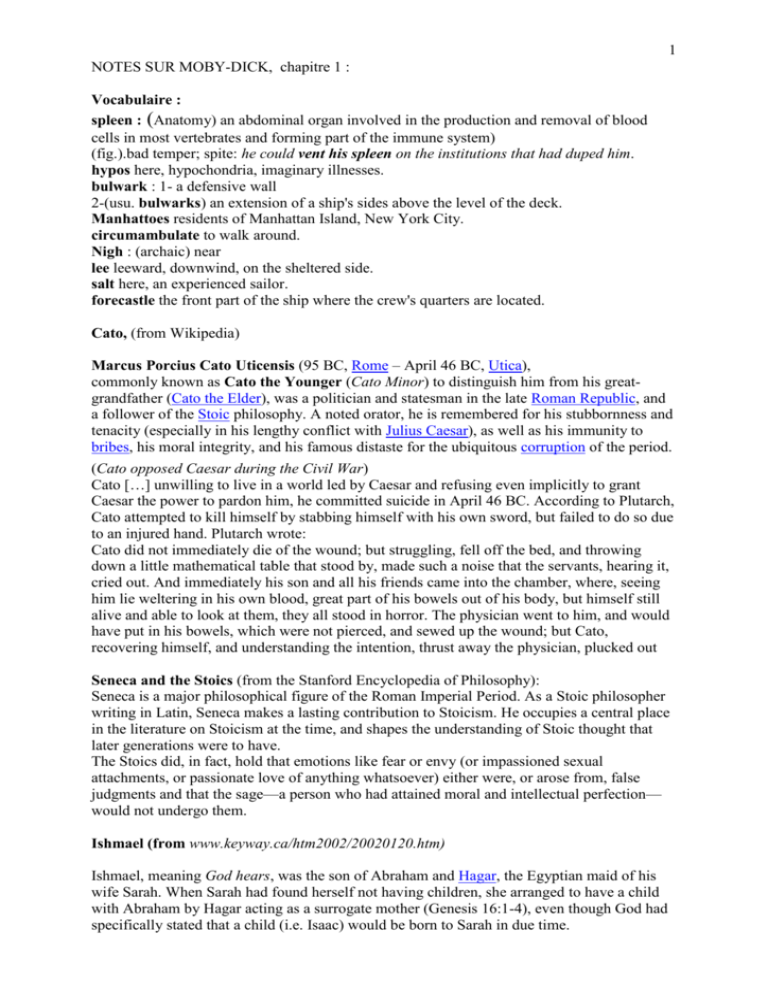
1 NOTES SUR MOBY-DICK, chapitre 1 : Vocabulaire : spleen : (Anatomy) an abdominal organ involved in the production and removal of blood cells in most vertebrates and forming part of the immune system) (fig.).bad temper; spite: he could vent his spleen on the institutions that had duped him. hypos here, hypochondria, imaginary illnesses. bulwark : 1- a defensive wall 2-(usu. bulwarks) an extension of a ship's sides above the level of the deck. Manhattoes residents of Manhattan Island, New York City. circumambulate to walk around. Nigh : (archaic) near lee leeward, downwind, on the sheltered side. salt here, an experienced sailor. forecastle the front part of the ship where the crew's quarters are located. Cato, (from Wikipedia) Marcus Porcius Cato Uticensis (95 BC, Rome – April 46 BC, Utica), commonly known as Cato the Younger (Cato Minor) to distinguish him from his greatgrandfather (Cato the Elder), was a politician and statesman in the late Roman Republic, and a follower of the Stoic philosophy. A noted orator, he is remembered for his stubbornness and tenacity (especially in his lengthy conflict with Julius Caesar), as well as his immunity to bribes, his moral integrity, and his famous distaste for the ubiquitous corruption of the period. (Cato opposed Caesar during the Civil War) Cato […] unwilling to live in a world led by Caesar and refusing even implicitly to grant Caesar the power to pardon him, he committed suicide in April 46 BC. According to Plutarch, Cato attempted to kill himself by stabbing himself with his own sword, but failed to do so due to an injured hand. Plutarch wrote: Cato did not immediately die of the wound; but struggling, fell off the bed, and throwing down a little mathematical table that stood by, made such a noise that the servants, hearing it, cried out. And immediately his son and all his friends came into the chamber, where, seeing him lie weltering in his own blood, great part of his bowels out of his body, but himself still alive and able to look at them, they all stood in horror. The physician went to him, and would have put in his bowels, which were not pierced, and sewed up the wound; but Cato, recovering himself, and understanding the intention, thrust away the physician, plucked out Seneca and the Stoics (from the Stanford Encyclopedia of Philosophy): Seneca is a major philosophical figure of the Roman Imperial Period. As a Stoic philosopher writing in Latin, Seneca makes a lasting contribution to Stoicism. He occupies a central place in the literature on Stoicism at the time, and shapes the understanding of Stoic thought that later generations were to have. The Stoics did, in fact, hold that emotions like fear or envy (or impassioned sexual attachments, or passionate love of anything whatsoever) either were, or arose from, false judgments and that the sage—a person who had attained moral and intellectual perfection— would not undergo them. Ishmael (from www.keyway.ca/htm2002/20020120.htm) Ishmael, meaning God hears, was the son of Abraham and Hagar, the Egyptian maid of his wife Sarah. When Sarah had found herself not having children, she arranged to have a child with Abraham by Hagar acting as a surrogate mother (Genesis 16:1-4), even though God had specifically stated that a child (i.e. Isaac) would be born to Sarah in due time. 2 Ishmael was born at Mamre, when Abraham was 86, 11 years after Abraham's arrival in what would become the land of Israel (Genesis 16:3). He grew up to be a man of the desert wilderness, with a wild and hostile attitude toward people, exactly as God described him to his mother before he was born: "Behold, you are with child, and shall bear a son; you shall call his name Ishmael; because The Lord has given heed to your affliction. He shall be a wild ass of a man, his hand against every man and every man's hand against him; and he shall dwell over against all his kinsmen." (Genesis 16:11-12 RSV). When a feast was held to celebrate the weaning of Isaac, who was born 13 years later, Ishmael caused trouble by insulting and mocking his little brother (Genesis 21:8-9). After Sarah, who by then had come to dislike both Hagar and Ishmael, saw what he was doing, she said to Abraham "Cast out this slave woman with her son; for the son of this slave woman shall not be heir with my son Isaac." (Genesis 21:10 RSV)
